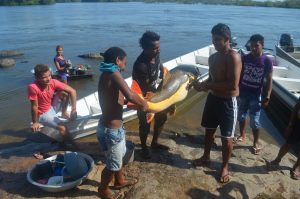
The newly created UF Biodiversity Institute (UFBI) awarded a Faculty Interdisciplinary Seed Grant to a joint effort by UF faculty, students and Brazilian collaborators of the Amazon Dams Network (Rede Barragens Amazônicas -ADN/RBA), hosted in the Tropical Conservation and Development Program (TCD) in the Center for Latin American Studies, in partnership with the UF Department of Geography, and the Levin College of Law.
The project “Incorporating traditional ecological knowledge and biocultural diversity into policy-making for infrastructure development across the Amazon” aims to develop an innovative approach to translate biocultural diversity into development policy and decision-making, through the creation of a transdisciplinary pilot training program for indigenous “paralegals” – providing indigenous communities with sufficient capacity to participate in large infrastructure planning processes across the Amazon Conceptually, this term is similar to “para-taxonomist” and “para-ecologist” terms already used to support community-based and citizen science programs for biodiversity assessment and conservation in the region. The framework and tools resulting from this project can serve as a model to inform UFBI strategies and programs for documenting and monitoring human and cultural dimensions of biodiversity, as well as to translate research on biocultural diversity into natural resource management, protection and sustainability.
The project will be developed through a collaborative effort by UF and Brazilian faculty and students, as well as Amazonian indigenous peoples, lawyers and public defenders. At UF, project leaders include Dr. Bette Loiselle (PI, TCD Director); Dr. Simone Athayde (Co-PI, co-leader ADN/RBA/TCD); Thomas T. Ankersen, J.D. (Legal Skills Professor and Director, Conservation Clinic, Center for Governmental Responsibility, UF Levin College of Law); Dr. Cynthia S. Simmons(Associate Professor, Department of Geography and TCD); Timothy E. Mclendon, J.D. (Staff Attorney, Center for Governmental Responsibility, UF Levin College of Law); and Dr. Michael Heckenberger (Department of Anthropology). UF Student Assistant is Brazilian lawyer and doctoral student in geography Ms. Maíra Irigaray. In Brazil, project leaders include Dr. Robertson Azevedo and Dr. Felício Pontes (Public Defenders, Ministério Público); Dr. Odair Giraldin (Universidade Federal do Tocantins-UFT); Dr. Paula Moreira (RBA/UFT); Dr. Juliana Laufer (RBA/UFT); Dr. Lígia Soares (RBA/UFT); Dr. Teodoro Irigaray (Universidade Federal do Maro Grosso-UFMT) and MS. Neiva Araújo (Universidade Federal de Rondônia – UNIR). Three Brazilian exchange students currently at UF – Monise Busquets (UFT), Adriana Medeiros (UNIR) and Esther Mesquita (UFPA) – will also be involved in this effort.
UFBI seed funds will leverage existing resources from ongoing programs in each of the participating departments. With support from NSF and CAPES projects, the TCD Program is currently sponsoring four doctoral students from Brazil. Using the facility of the College of Law’s Program in Sustainable Development Law in Costa Rica, and support from UFBI, Ms. Esther Mesquita, a doctoral exchange student from Universidade Federal do Pará (UFPA) in Brazil, will be partnered with UF Law students Honor Humphrey and Pilar Morales Giner, and charged with assisting with research on basic infrastructure law and planning processes, and in drafting a pilot guide for training purposes. Using the facility of the College of Law’s Brazilian Judges and Prosecutors Training Program, UFBI seed funding will support the participation of Amazonian public defenders in an annual workshop at UF, who will develop law and policy analyses for incorporating biocultural diversity and a formal procedural role for indigenous paralegals under Brazilian law. Seed funding will also support a UFBI workshop that brings together indigenous leaders to validate and share the framework and tools that result from it.
Expected outcomes from this project include: 1) Larger proposals to be submitted to NSF and private foundations, to support project implementation and continued engagement by participating units, 2) A validated training manual for incorporating biocultural diversity and training indigenous paralegals in infrastructure development processes, 3) A white paper (policy analysis) that characterizes current law and policies governing planning processes in Amazonian infrastructure development with recommendations for reform, and 4) Outreach materials in accessible languages and varying formats, including digital platforms.